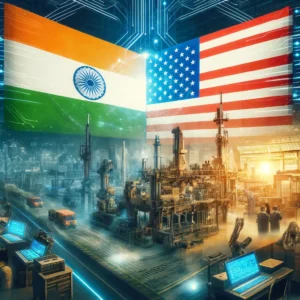The Global Impact of Made in India Products: An American Perspective
The phrase “Made in India” is becoming increasingly common in the global marketplace, and the United States is no exception. Over the past few decades, India’s manufacturing capabilities have expanded dramatically, making it a key player in various industries that impact consumers, businesses, and governments worldwide. From technology and textiles to pharmaceuticals and automotive components, Indian-made products are contributing significantly to global supply chains, particularly in the US.
For American businesses, India’s rise as a manufacturing powerhouse offers a range of opportunities, from cost-effective production to high-quality craftsmanship. Consumers in the US are also benefiting from affordable yet high-quality goods produced in India. In this blog, we’ll explore how “Made in India” products are reshaping the American market, the benefits to US companies, and the overall impact on global trade.
1. India as a Strategic Manufacturing Hub for US Businesses
For many US businesses, the decision to source products from India is about more than just cost savings. India has emerged as a key strategic manufacturing partner, providing not only affordability but also quality and reliability in production. As American companies seek to diversify their supply chains away from traditional hubs like China, India offers an attractive alternative.
Diversification of Supply Chains
One of the most significant shifts in global trade over the past few years has been the reconfiguration of supply chains. Many US companies, particularly in the wake of trade tensions with China and the COVID-19 pandemic, have been looking for new partners to diversify their sourcing. India has emerged as a major player in this diversification strategy.
By moving some of their manufacturing operations to India, US companies are reducing the risk of over-dependence on a single market. This diversification allows for greater flexibility and resilience in global supply chains, especially in industries such as electronics, automobile, and pharmaceuticals.
Cost-Effective Production with Quality Assurance
For American businesses, one of the most appealing aspects of sourcing from India is the balance between cost and quality. While India provides lower labor costs compared to the US, it also offers a highly skilled workforce, particularly in technology and engineering. Indian manufacturers have earned a reputation for producing high-quality goods at competitive prices, making them a valuable partner for American companies in industries like textiles, electronics, and automotive components.
For example, many US tech companies rely on Indian manufacturers for producing electronic components such as circuit boards and microchips. Similarly, Indian factories produce textiles and apparel for major American fashion brands, often at a fraction of the cost of domestic production, without compromising on quality.
Government Initiatives and Trade Agreements
The Indian government has been proactive in making the country an attractive destination for foreign investments, especially through its “Make in India” initiative. The government’s aim is to streamline processes for foreign companies looking to set up operations in India.
From an American perspective, this has opened doors for partnerships and collaborations. US companies are increasingly finding it easier to do business in India, thanks to improved infrastructure, regulatory frameworks, and trade agreements between the two nations.
2. Impact on US Consumers: Affordable, High-Quality Goods
Indian-made products are not just benefiting US businesses; they are also making their mark on American consumers. From affordable clothing and accessories to high-quality electronics and home goods, Indian products are becoming increasingly popular in the US market.
Textiles and Apparel
India has long been a leader in the global textile industry, and its influence is strongly felt in the US. Many well-known American fashion brands source their fabrics and garments from India, benefiting from the country’s rich tradition of craftsmanship. Indian textiles, known for their durability, intricate designs, and sustainability, are highly valued by US consumers.
Additionally, the shift towards sustainable and ethically-produced goods in the US has led to increased demand for Indian-made products that adhere to these standards. Indian manufacturers are responding to this demand by producing eco-friendly textiles, using organic cotton, and employing sustainable manufacturing practices.
Pharmaceuticals and Healthcare
India is one of the largest producers of generic pharmaceuticals in the world, supplying a significant portion of the medications used in the US. Indian pharmaceutical companies manufacture high-quality generic drugs at a lower cost than many US-based companies, making essential medicines more affordable for millions of Americans.
The global pandemic highlighted the importance of India’s pharmaceutical industry, as it became a critical supplier of medicines and medical equipment to the US. As healthcare costs continue to rise in the US, India’s role in providing affordable pharmaceuticals is likely to become even more significant.
Technology and Electronics
India has rapidly grown its expertise in producing high-quality electronics and technology products. American tech companies such as Apple and Dell have tapped into India’s manufacturing potential to produce components and devices, reducing their production costs while maintaining quality.
For US consumers, this means access to affordable electronic devices that meet global standards. Whether it’s smartphones, laptops, or wearable tech, Indian manufacturers are helping American tech companies meet consumer demand for cutting-edge technology at reasonable prices.
3. Challenges and Future Outlook
While the impact of “Made in India” products on the US market has been largely positive, there are still challenges to be addressed. Infrastructure improvements, regulatory complexities, and the need for consistent quality control are ongoing concerns for US companies working with Indian manufacturers. However, as India continues to invest in its manufacturing capabilities, many of these challenges are being addressed.
Infrastructure Development
India has made significant strides in improving its infrastructure, but challenges remain in areas such as transportation, logistics, and energy supply. For American companies looking to scale their operations in India, these infrastructure gaps can pose logistical challenges. However, ongoing investments in infrastructure development, such as new ports, highways, and power projects, are expected to alleviate many of these issues in the coming years.
Sustainability and Ethical Sourcing
As US consumers become more concerned with sustainability and ethical sourcing, there is growing pressure on Indian manufacturers to meet these demands. Many American companies are increasingly looking for partners who can offer transparency in their supply chains, adhere to environmental standards, and ensure fair labor practices.
India is responding to this demand by implementing more stringent sustainability practices and certifications in industries like textiles and agriculture. This shift towards ethical manufacturing is expected to enhance the appeal of Indian-made products in the US market.
Conclusion
The global impact of “Made in India” products is undeniable, and from an American perspective, the benefits are clear. India provides a reliable and cost-effective manufacturing base for US businesses, while delivering high-quality goods to consumers at competitive prices. As US companies seek to diversify their supply chains and reduce production costs, India stands out as a key player in the global manufacturing landscape.
With its growing infrastructure, skilled workforce, and government support, India’s influence on the US market will only continue to grow. For American businesses and consumers alike, “Made in India” products represent both opportunity and value, contributing to a more dynamic and interconnected global economy.
Looking to expand your brand’s reach into the lucrative Indian market? Avenue Consumer Brands is your trusted partner in navigating the complexities of Indian manufacturing and distribution. From market research to end-to-end supply chain management, we offer the expertise and local connections needed to help American consumer brands unlock new revenue streams in India. Partner with us today to scale your business with confidence and ease. Let’s grow together!
FAQs
- How are “Made in India” products benefiting US businesses?
US companies benefit from lower production costs, high-quality manufacturing, and access to skilled labor when sourcing products from India, helping them remain competitive globally. - Why are US companies diversifying their supply chains to include India?
Due to rising costs in other regions and trade tensions, US businesses are diversifying their supply chains to India for its cost-effectiveness, growing manufacturing capacity, and government incentives. - What types of products are commonly manufactured in India for the US market?
India manufactures a wide range of products for the US market, including textiles, electronics, pharmaceuticals, automotive components, and consumer goods. - How does the “Make in India” initiative impact trade with the US?
The “Make in India” initiative encourages foreign investment and makes it easier for US companies to set up manufacturing in India, leading to stronger trade relations and expanded business opportunities.


